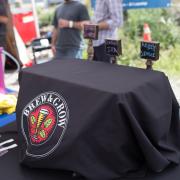Got this in my in box dis morn;
All grain kits were shipped out yesterday via FedEx Ground. A hardcopy of the BHHCC 2014 Rules & Regulations are included in the shipment, but here is a cut-and-pasted version:
Thank you for participating in the 5th Annual
Beer Hoptacular Homebrew Club Challenge!
This is a unique opportunity to compete head-to-head (so to speak) with other tri-state area homebrew clubs, with one being crowned Chicago’s “Beer Hoptacular Homebrew Club of the Year”
Just a reminder that there is no competition entry fee and each competing club will receive two complimentary tickets to the Beer HoptacularSaturday afternoon session, October 11th, 2014.
Enclosed, please find a total of 10 lbs. of grain (generously donated by Mid Country Malt Supply, South Holland, Illinois). There is one bag with 8 lbs. of Malteries Soufflet Pilsner Malt (1.8L) and one bag with 2 lbs. of Malteries Soufflet Munich Malt (6 - 8L)
There are no style requirements other than brewing a “session” type beer. Using all of this grain in a 5 gallon batch should produce an original gravity of approximately 1.050.
Joe, looks like this years comp is up your alley!










WE are gonna hit em hard with a Dampfbeir!
I'll teach the no sparge method for this one. Let's get the best malt flavor possible!
Will there be opportunity for other members to help with this, or will the brew time be posted so that someone can come witness the magic at work?
I know time is of the essense but didn't we have members submit recipes once and have some discussion?
The plan Chuck and I bounced around this morning was a Dampfbier, I served one at the brewbq, that's a perfect grain bill for it, and it's not the obvious choice of saison. We'll use wyeast Bavarian wheat, it produced some really nice stone fruit, and dark fruit, flavors and aromas that played very nicely with all the maltiness. I don't know about no spathe methods, but im on board to do it James. The plan I had was to Brew it Saturday night at the beginning of Kyles going away, so that we can all share one last brew with him, and it will be a true community brew.
https://byo.com/stories/item/530-dampfbier-style-profile
There's a bit of info on the style, long story short, its a barley beer fermented with wheat beer yeast. Chuck and I are proposing this dampfbier based on notion that most everyone given that grainbill will go for a saison, or possibly an IPA, the Dampfbier is an odd style, which I think will work in our favor, provided we submit under the correct BJCP category, because unless the judge has been to bavaria, this is a beer none of them will have anything commercial to compare to. no preconcieved notions that we are fighting against. Also it will stand apart from the crowd and be unique, not so unique as to be odd, but clearly different than the competitors. As the instructions suggest it is a nice sessionable refreshing brew. When I did mine I used the Bavarian Wheat strain and got some nice stone fruit/dark fruit flavors and aromas, which kind of pick up where the malt leaves off, they work very well together, and it's refreshing. Hops are simple, just there to counter balance the sweetness of the malt, I think we'll be up against a lot of saisons with too much coriander and orange peel, and IPAs with too many hops, I'm submitting the Dampfbier plan as an elegant beer to showcase the malt they've given us, which is the reason for the competition, and to lightly embelish it with what the wheat yeast brings to the table to complement it. Simple, straightforward, elegant. I tossed together a recipe proposal real quick to get the ball rolling, I don't know enough about the no sparge method James mentioned to program it in Beersmith, but I propose we follow James' no-sparge method and also add some calcium chloride and a few other things to wring out all the possible maltiness we can.Hoptacular Dampfbier.pdf
Thoughts? I am loving Joe's recipe! It follows the outside the box beers we have submitted in the past to this comp.
Past beers brewed for Hoptacular;
Punk Rauch. 8lbs of 2row and 2lbs of Vienna malt.
We smoked the vienna malt for 3 hours over cherry wood.
Placed 2nd
Stevens Gruit. Can't remember the grain bill on this one but Steven went off the chain by submitting a beer brewed with no hops!
Placed 3rd
Barrel Aged Marzen. 10lbs of Red X
We lagered this bad boy in a barrel! By far the best beer we ever have entered.
Placed 2nd.
Joe, I like the idea of doing something original Is this the one you brewed for Brew BQ?
Love the idea of one last brew on Saturday too!
One last chance to give all you guys some "pointers"!
Last year the ingredient was solely a sack of Red X malt and the field was wide-open in terms of style and strength. This year we are very limited with a session beer and ingredients.
I like the idea of doing a Dampfbier and a group brew on Saturday.
Joe just an FYI, Local Option does make one called Bierwerker.
Here's a bit of background and directions for a No Sparge Brew:
No-sparge Brewing - A simple approach to more malt flavor?
For homebrewers, the sparging portion of the brew day (where you add water to your grain bed after draining the wort from your mash, to rinse remaining sugars out of the grain) usually comes down to two options: batch sparging and fly sparging. Batch sparging - the more popular option - involves adding all of the sparge water at once (or in two portions, if your mash tun can't hold it all), stirring well, and letting it sit for 5-10 minutes before vorlaufing and draining the wort into your boil kettle. Fly sparging, on the other hand, requires sparge water to be added at a continuous rate, while simultaneously draining into the boil kettle. This results in a slightly-increased efficiency, but obviously involves more time (approximately an hour).
Why do this? Apparently, it results in a richer and more-intense malt flavor, with less harshness compared to other methods, according to Strong; he also mentions that the resulting beer is also a bit deeper in color, with lower acidity. This may not be a technique you'd use for a hop-forward beer, such as an American IPA, but for malt-forward beers, such as Scotch Ales, it sounds like something worth trying.
One thing to keep in mind here is that with this method your efficiency will obviously take a big drop, which means that no-sparge brewing is more expensive. Since you're adding water to your first runnings to get up to your boil volume, as compared to lower-gravity second runnings from a sparge, you would have to use more grain than normal for your mash. Strong suggests measuring the gravity and volume of your first runnings, which you can then use to calculate your efficiency for future no-sparge brews. This basically means your first attempt will be a bit of a guinea pig-approach. As for this first attempt, Strong writes that a 1/3-increase in your grist is a good place to start.
A slightly different no-sparge method is suggested by John Palmer, another very well-respected and well-read homebrewer. Palmer's approach involves adding the water that you would normally use for the sparge (roughly 1.5 times the water used in the mash) into the mashtun at the end of the mash. The full amount in the tun is then drained into the kettle, and should equal your target boil volume. This method has the benefit of requiring less grain then Strong's approach (approximately 25% more than the standard grain bill, instead of Strong's 33%). However, the disadvantage is that your mashtun would obviously have to be large enough to hold the entire amount of brewing liquor and grain; maybe not a concern for small (lower-ABV) beers, but could easily cause trouble with bigger, or even moderate-strength beers for those of us with 10-gallon mash tuns. You would also have to calculate the temperature of the additional water to add, so that you don't exceed 170 F, which may lead to leeching of tannins into the wort. For Palmer's full article (and some handy calculations you can complete to make things easier), check it out here at the Brew Your Own site.
Joe, can you email me your beer smith file? I can plug in the tower of power and the no sparge setup.
Changes to the recipe:
90 min boil
Smaller batch size to make up for loss of efficiency (60%)
No sparge
1. Use the TOP
2. Use a higher grist to water ratio. I use 2qt/lb
3. With the TOP set the strike water at 148 to start, add the grain, (which will lower the temp) and use the TOP to adjust back up to 148, then use it to step to 154. Turn the pump off and stir from time to time. Dont stir with the pump on.
4. Fill the top kettle with the sparge water, heat it to no more than 168, better to be under.
5. After 60 min mash add the sparge water to the mash for mash out
6. Heat after adding water to get mash to 168 for mashout.
7. Drain into boil kettle, after its all there mix it around and take gravity. If the preboil gravity is to high, dilute. If to low extend the boil.
Easy!
Water
You are mostly right on. I think wheat beers gain a ton from bing more acidic. So i pushed this water profile towards that edge with hydrochloric acid. Mark bought a ton of it. Its at the brewhouse somewhere. Ask him.
If you can figure out a way to ferment at a lower temp (62*) do that. It will restrain the phenols.
I have the yeast and hops in my possession
How did it go yesterday?
How did it go yesterday?
Good. We came in a bit above are targeted gravity, so we added a bit of water for a 1.053 O.G. Swung by the brewhouse dis morn and the yeast is going full bore.
You guys should enter it in this competition as well
http://www.hirter-uberbrew.com/
FYI...Today is the last day to enter for the Hiter Uberbrew competition.
and this:
This email is just a friendly reminder that an important deadline is approaching. Per the Beer Hoptacular Homebrew Club Challenge instructions, all entries in this competition must be submitted no later than 3:00pm on Thursday, October 9th -NO EXCEPTIONS!
Further details on complimentary tickets to the fest will be forthcoming the week of this event.
Good luck to all...
Cheers!
Marty Nachel
BHHCC
Ken, did this e-mail have a link for the compitition form/label we are suppose to fill out and submit with each bottle?
If so could you post it here, so I can print those out and get the beer to the drop off point on Tuesday
It did not, but here is the event organizer Marty Nachel's email: aleconner@aol.com
E-mail sent.
Thanks Ken!
Our Dampfbier has been dropped off at Mid Country Malt dis morn.
How did it go last night?
I thought the winner was announced at the second session today. I'm waiting with bated breath to hear how we placed!!!!!!!!!
Forever 2nd!
Congrats chuck and joe. That's incredible. 4 for 4.
Well done, guys!
Congrats on placing! Great job!
Thanks Everyone :) Really hoping for a first, but a 2nd is good, I thought we had it this year...there's always next though. We'll keep trying that's for sure. Also, I don't know who got first or what style it was, but congratulations to them as well.
Great job guys!
Definitely an awesome job!
Still wouldn't hurt to find out what the 1st place beer was (and who won it)...
A beechwood aged saison from a club I have never heard of...
I stand corrected, A Belgian IPA aged on Spanish cedar took !st by ABnormal Brewers.